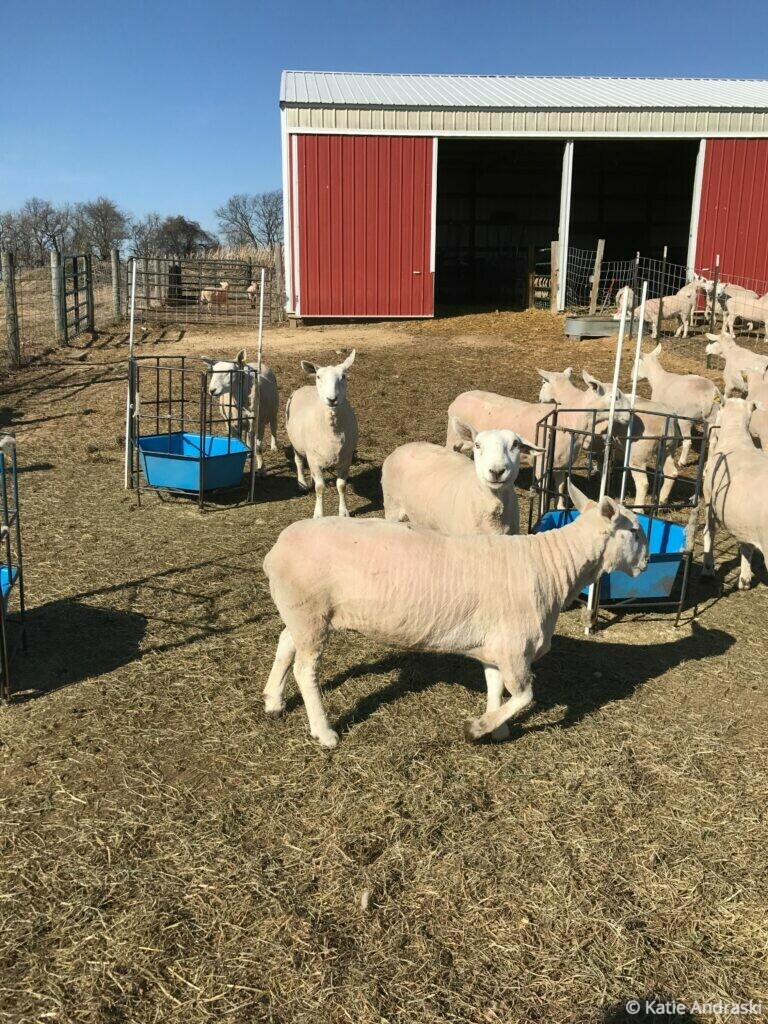 Lamb of God who takes away the sins of the world, have mercy on me.
Lamb of God who takes away the sins of the world, have mercy on me.
Who ever would dump their dead sheep in the ditch along our road–the flies matted around her eyes, her mottled ear vulnerable as if she were some little girl’s pet and the parents didn’t want her seeing her lamb dead? Or were they too lazy to dig a hole? Or was the animal the kind of sick the government might kill the herd? It’s not like a sheep escaped from a neighbor and was hit by a car because our neighbors don’t own sheep.
Lamb of God who takes away the sins. The God who told the Israelites that to celebrate their escape from Eygpt, they’d have to take a lamb, a perfect lamb without blemish, slaughter it, put its blood on the lintel and eat the rest, eat it all up, and ready to march. The blood told the angel not to slaughter their first born. Without that shelter of lamb’s blood, Eygpt was doomed. And Israel freed. And for the party, for Passover, each family was to bring the lamb into the household. Four days he became a pet. Then they would slaughter it.
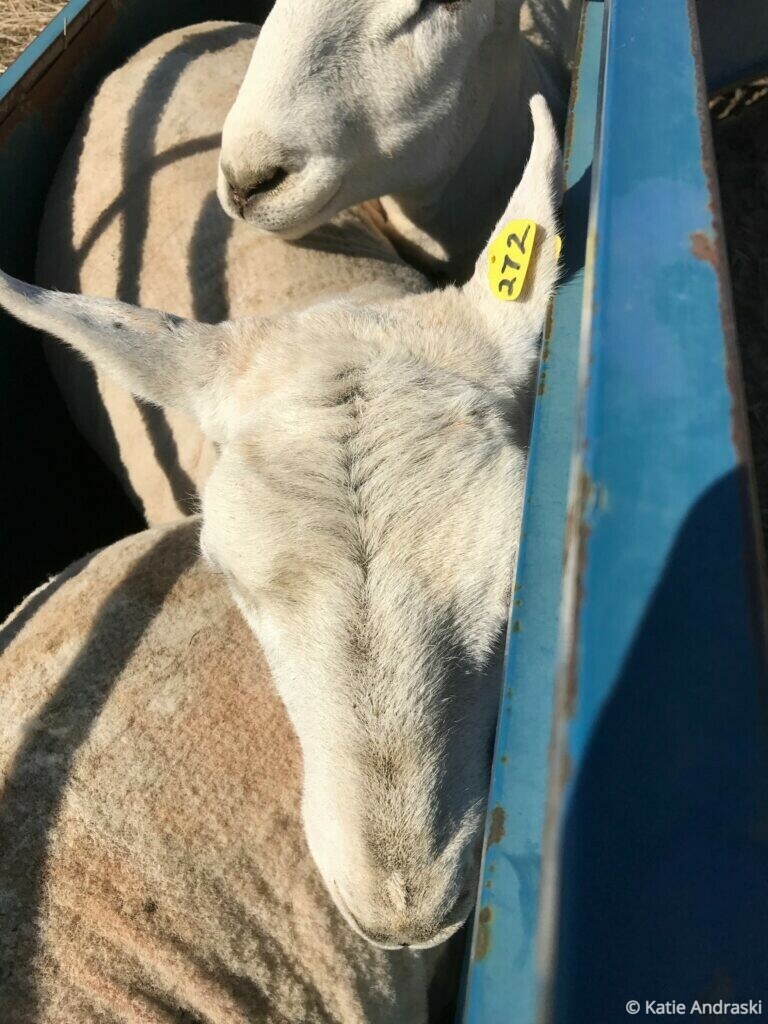 Seems like God wanted them to feel the animal beloved before he was sacrificed. He wanted us to feel what it might have felt like for Him, Lamb of God who takes away the sins of the world, For God so loved the world that he gave his only begotten son…What it felt like to give your beloved to a world so dark.
Seems like God wanted them to feel the animal beloved before he was sacrificed. He wanted us to feel what it might have felt like for Him, Lamb of God who takes away the sins of the world, For God so loved the world that he gave his only begotten son…What it felt like to give your beloved to a world so dark.
Lamb of God. Have mercy. Lamb of God.
I did not take a picture, though I was tempted, because I did not want to show you a dead lamb, lamb of God. It was too sad, too ugly. The smell crept into my nostrils. The dogs wanted to sniff. We saw no buzzards dropping into the ditch, or coyotes. But Bruce said the warm days and nights, cleaned up the carcass.
I have read the story of David, how the prophet told him about a man throwing a party, who took his neighbor’s pet lamb for the main course, while he had flocks and flocks. David, it was David, who did such a thing, taking Bathsheba, a woman without a choice, not even respect for her marriage could stop him, from taking her, laying with her. She had no choice, when the king seeks her body.
And then we learned how the Temple was trampled by manure and urine when Jesus wove the whip that drove the money changers and livestock brokers out. With our meat packaged in white paper or cellophane, refrigerated in neat rows in the supermarket, it’s hard for us to imagine that slaughter, how the temple was an abattoir for the forgiveness of sins. And then the cross.
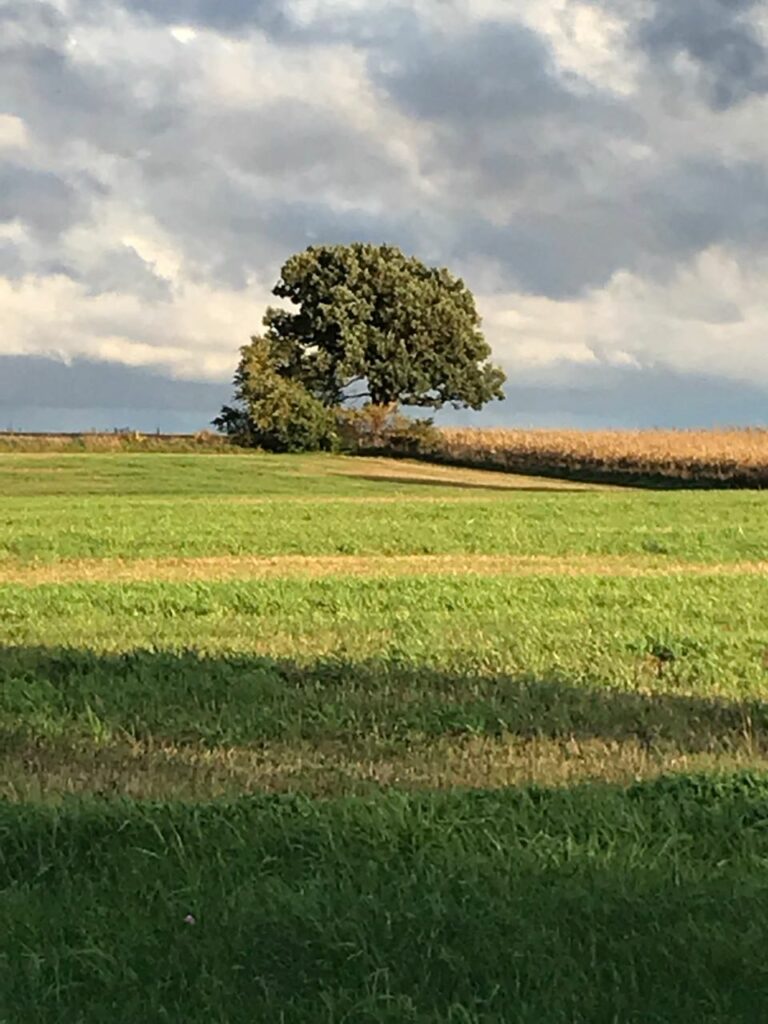 I carried the smell in my nostrils up the road, the road where I thank God for my breath, looking at the long lines of the power poles and the trees gathered around our house, and the oak in Peterson’s field, an oak left standing, in the middle of fields, to give the farmer and his working horses, shade.
I carried the smell in my nostrils up the road, the road where I thank God for my breath, looking at the long lines of the power poles and the trees gathered around our house, and the oak in Peterson’s field, an oak left standing, in the middle of fields, to give the farmer and his working horses, shade.
I carried the smell right into the house, with company coming, and I’m not good at hospitality, though Bruce is very fine at this. Ever since I was a toddler, I haven’t been friendly to the idea of people coming into my house, though the Lamb himself bids us who are blessed to bless others. We invited one woman to stay and as hard as I cleaned my house, it could not compare to what she was used to. She posted pictures of the next place she stayed. My place could never compare.
I wanted the house to smell clean, as clean as a farm house can, without the smell of death. We looked under couches, behind the refrigerator and stove. But nothing. Smudgie had not halfway killed a mouse, only for it to die in a hidden hole.
As woman in her sixties, whose brother died at thirty-five, and mother died at 60, and father at 69, I often think about dying. I felt old at 32, with all those losses, even though my family did not fail little bit by little bit. They were here and then they were gone. Even then I knew there was mercy in those deaths, but what a long ass walk up the steep hill of grief. I can look to the horizon, knowing that as far as I look, I won’t find them on this green earth. A former pastor has said, “If they are in Christ, and you are in Christ, you are not far from each other.” We are surrounded by a great cloud of witnesses, which is a mystery in itself. People say they can sometimes feel their loved ones’ presence. Not so much for me. But when each one died, I felt it, that their funeral was more like a wedding, that this death stuff was not the final word.
I don’t want to die. I so don’t want to die, but I’m no saint like Anna who was given the promise she’d see Christ’s arrival. I’m no saint to be caught up in the air, the chariot and fiery horses slowing to pull me aboard. I don’t want to die, but then again I feel like Paul, I’ve run the race, as good as I could run it. It’s been a good life. God has been good. God has blessed. And I fear. I fear something horrible is unraveling, just below the horizon, and will I, will I be brave enough to stand, having done all to stand?
I curled up in the stink curled in my nostrils. I got up, went outside to smell the chemicals the floaters laid down on the fields. Morgen whinnied, Tessie whispered. The mares called me to them.
It’s a genius of Christianity that we are told to look towards Jesus’ second coming, not to our dying. We are told to look to the skies, look to the blessed hope, the hope that Jesus will return during our lifetimes. We are told to hope that we will be glad to see Him, that we will be like Him because we’ll see Him as He is. Awhile ago I read that Dallas Willard, hoped he’d be so close to the Lord that he’d not know he died, that he’d step from here to there, just like that.
In “You Will Not Experience Death” on Soul Shepherding, John Ortberg is quoted as saying, “When Dallas Willard was diagnosed with pancreatic cancer in late summer of 2012, one of his reflections was: “I think that, when I die, it might be some time until I know it.” Dallas was always saying things that would never occur to anyone else. He said that a person is a series of conscious experiences, and that for the one who trusts and follows Jesus, death itself has no power to interrupt this life. Jesus himself said that the one who trusts in him will not taste death.”
And Walt Wangerin said that he’d be in the dark, and then hear his name called, “Walt.” “Here am I,” he’d say and walk into his Lord’s arms. (I can’t find the passage but it brought me to tears when I read it.)
We entertained one friend, the dead smell muted. But the smell worsened. Was it the house belching her displeasure at our living here? (She’s not always been happy about us.) Was the rot from the sheep stuck in my nose? Another guest was on her way, a writer I’d met on Facebook, and I was honored she wanted to stop, but when your house has B.O. it’s an embarrassment to bring anyone else inside, even if they now how it is with old farm houses.
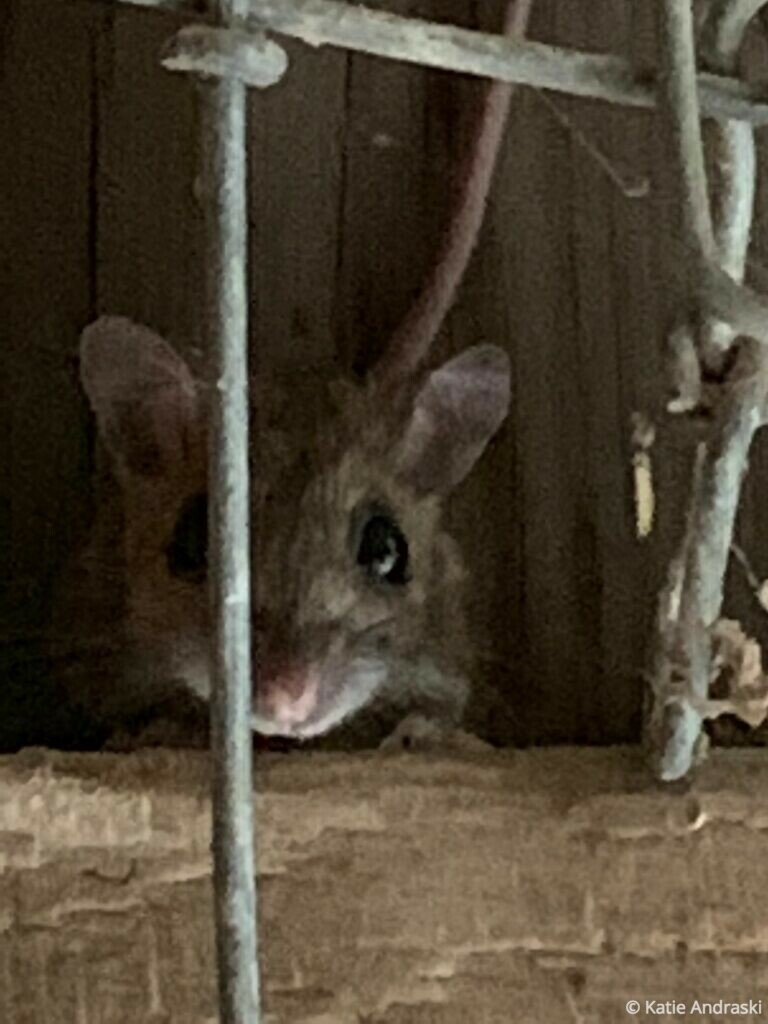 While I was out riding my horse, Bruce figured out the smell was the worse by the register by the front window. He said he’d find the mouse the last place he looked. Patiently he took apart the duct work. Nope it wasn’t in the ducts that connected to the vent beneath the window. Nope it wasn’t in duct work beneath the crawl space.
While I was out riding my horse, Bruce figured out the smell was the worse by the register by the front window. He said he’d find the mouse the last place he looked. Patiently he took apart the duct work. Nope it wasn’t in the ducts that connected to the vent beneath the window. Nope it wasn’t in duct work beneath the crawl space.
The smell crawled into my nose.
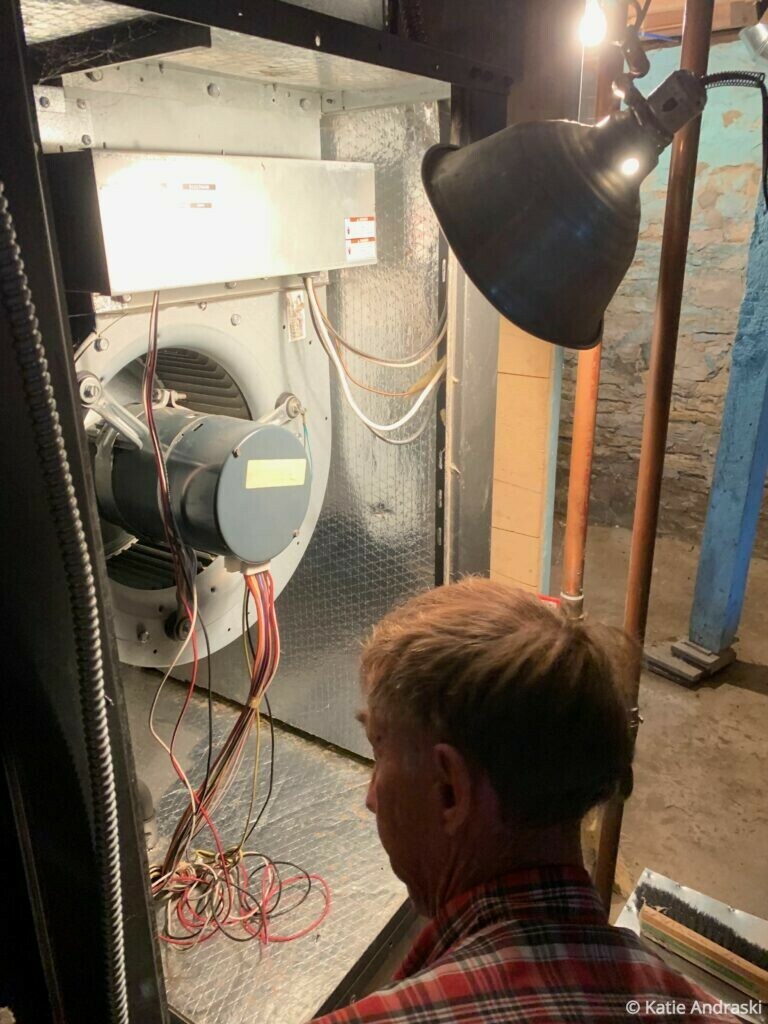 I was talking to Deb on the phone and asked for prayer we’d find the dead mouse. Right then Bruce came up stairs and gave a thumbs up that he’d found it on the heat coils of the furnace. He’d had to take the furnace apart. He said the mouse was still wet.
I was talking to Deb on the phone and asked for prayer we’d find the dead mouse. Right then Bruce came up stairs and gave a thumbs up that he’d found it on the heat coils of the furnace. He’d had to take the furnace apart. He said the mouse was still wet.
With the mouse buried, the air in the house cleared, became clean again.
I stopped thinking about dying and picked out what pictures I’d enter for the Boone County Fair. Every year the fair fills with so many strangers, we run into fewer people we know, and mark the people who aren’t there any longer. It marks the end of summer. Every year I think about what it would be like to show my horses here, and shake my head and say nah, not really interested in cooping them up for five days.
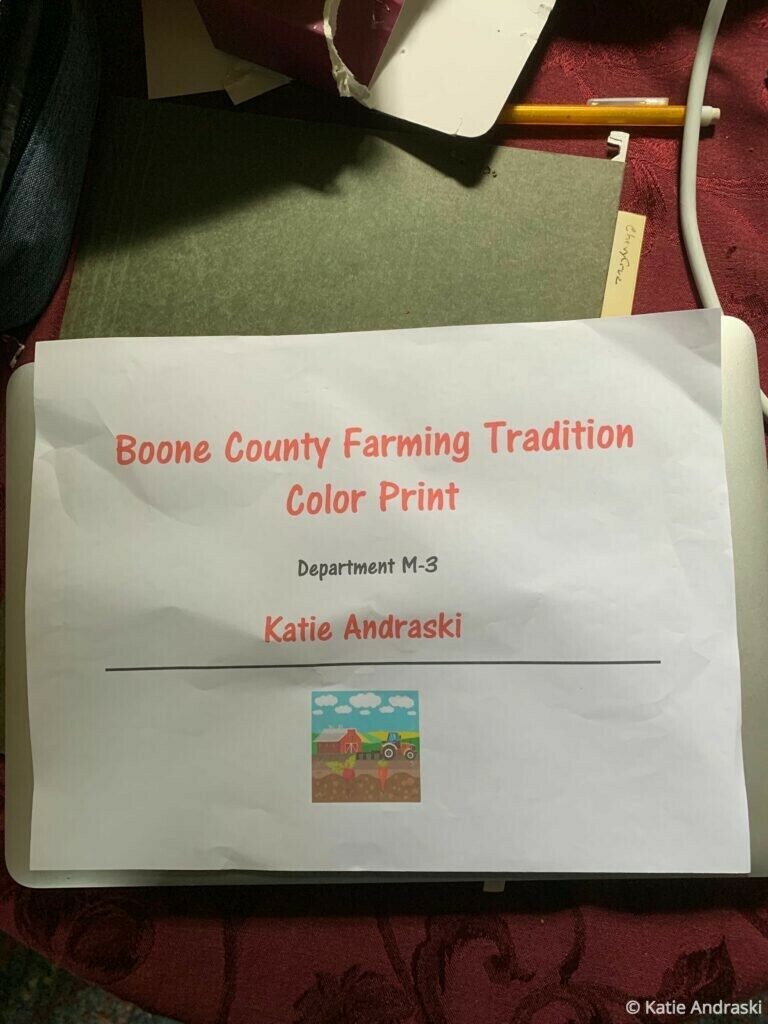
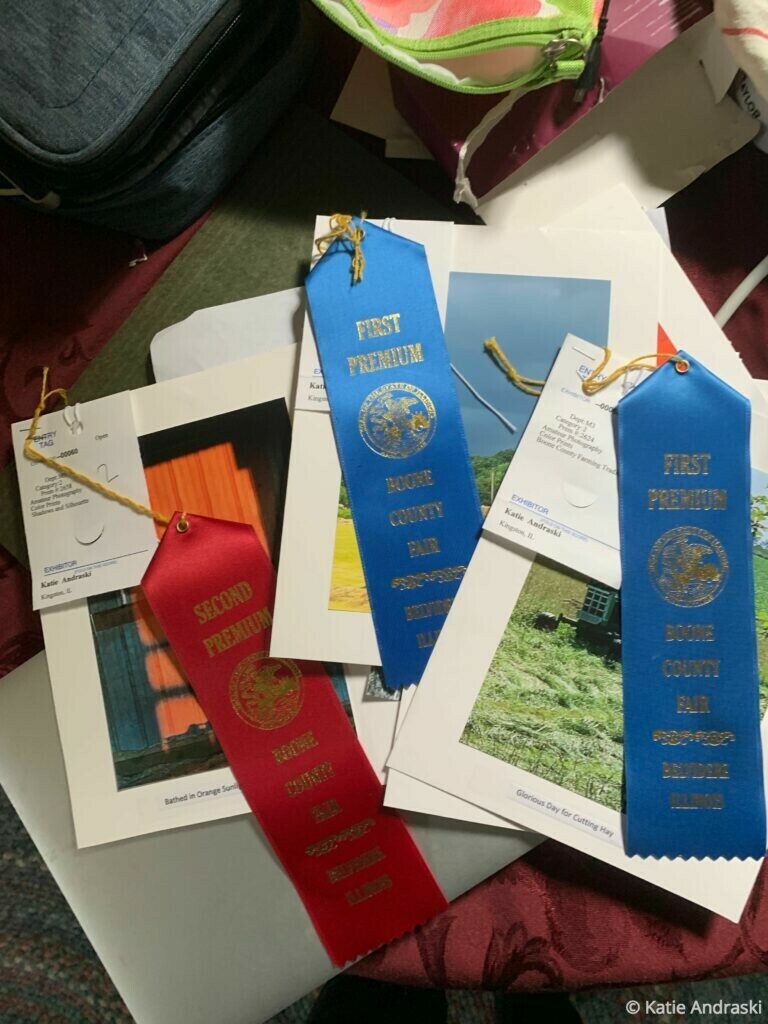 When we walked into the Home Ec building I was surprised to see that my picture of Beaux Fowler cutting our abundant hay won the award for color picture that exemplified Boone County’s farming tradition. And the picture that showed the storm bearing down on our first hay wagon won a blue ribbon. And a picture I must have caught at sunrise of the sun catching my shadow against the barn door won a second place. I was pleased because most years my pictures haven’t done anything. I think the newer camera on the iPhone has made all the difference. You’ve seen these before:
When we walked into the Home Ec building I was surprised to see that my picture of Beaux Fowler cutting our abundant hay won the award for color picture that exemplified Boone County’s farming tradition. And the picture that showed the storm bearing down on our first hay wagon won a blue ribbon. And a picture I must have caught at sunrise of the sun catching my shadow against the barn door won a second place. I was pleased because most years my pictures haven’t done anything. I think the newer camera on the iPhone has made all the difference. You’ve seen these before:
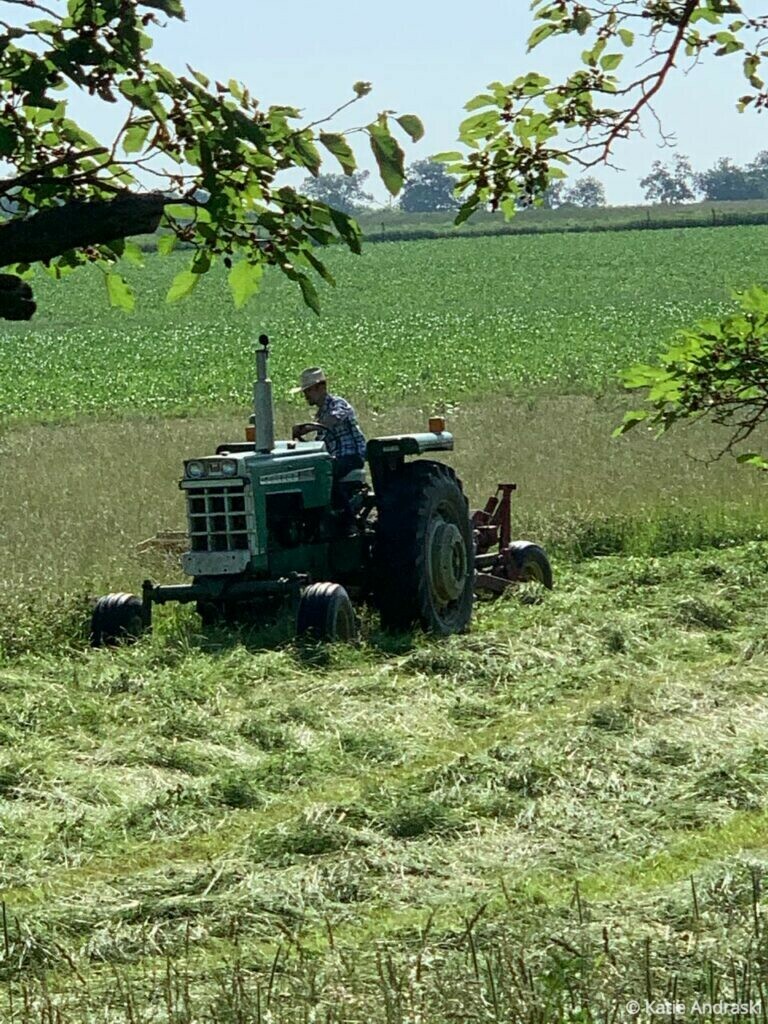
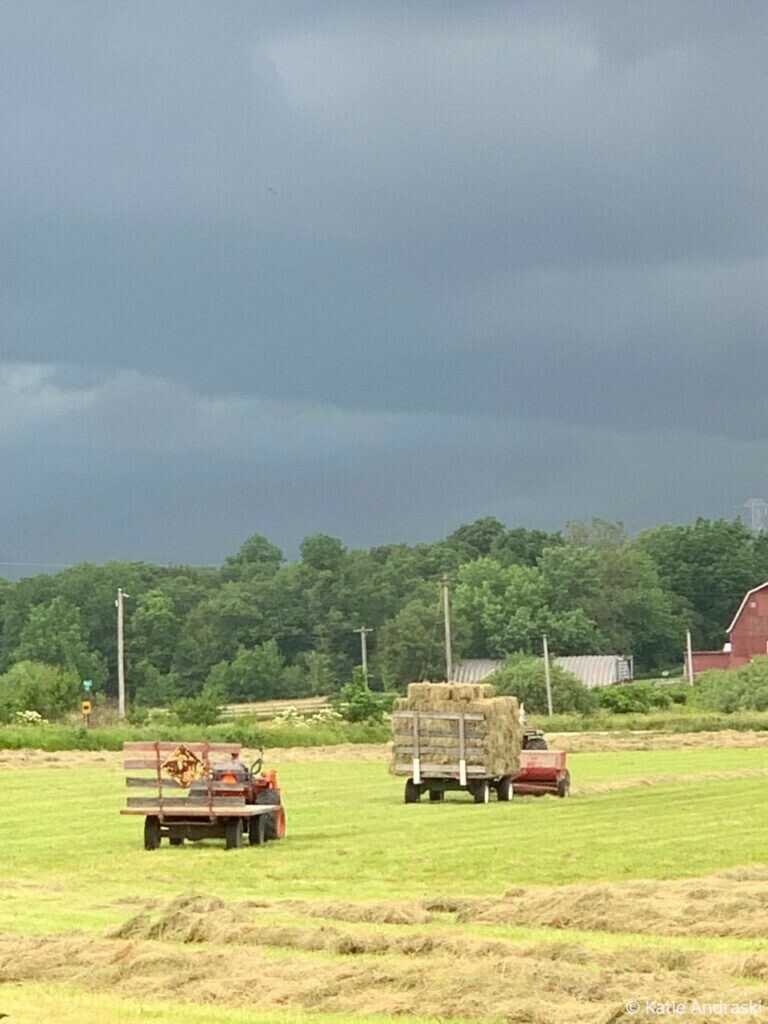
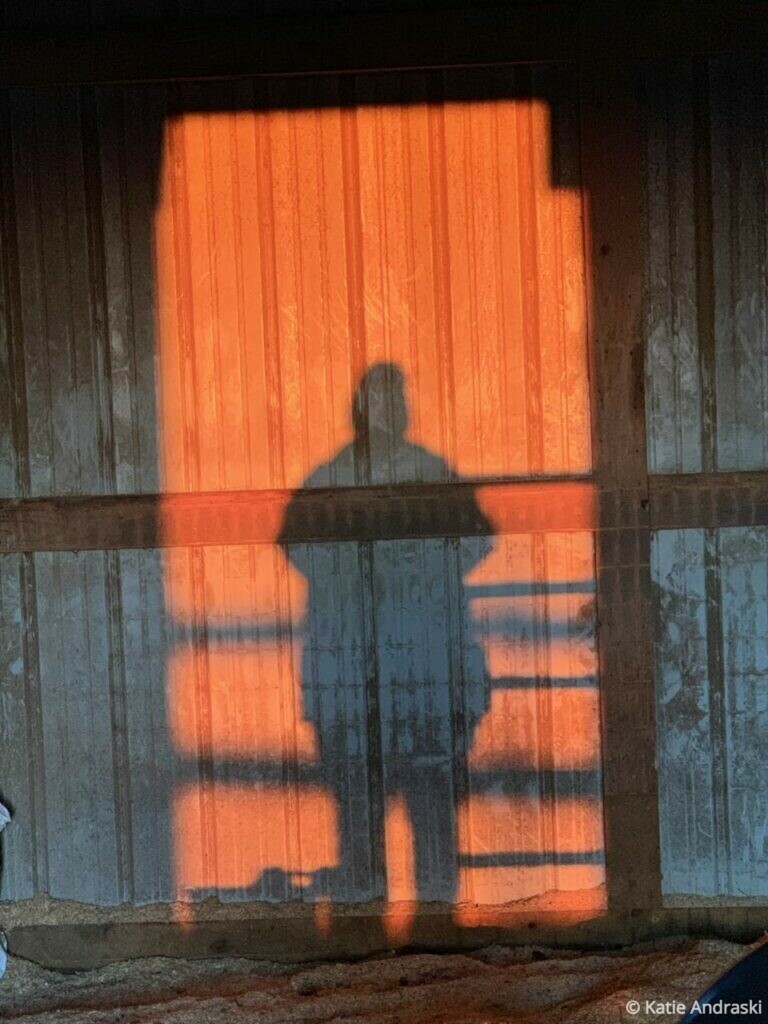
For awhile, I’ve wondered what what’s so good about the gospel. I was raised hearing about how we’d burn in hell. Conservative preachers are gobsmacked that we don’t talk about hell much any more, but I’m not so sure that’s a bad thing. I remember vomiting between the pews because of the terror. Does God really dangle people like spiders over hellfire, taking delight in our torment as Jonathan Edwards said? If that is God, then he sounds wicked. That’s not the God I’ve found in the Bible, even when he’s doling out judgement. He cries out: “How could you leave a spring of living water for a dried out cistern?” That’s not Jesus who cried out, “Father forgive them for they know not what they do” when we did the very worse thing humans could do–kill God.
The Daily Office has offered readings from the book of Acts these last few months. It’s funny that hell fire isn’t part of the message the apostles preached. Paul infuriates Jewish people with how he tells the story of Jesus. In front of Felix, the Roman tribunal who was trying to sort out whether he was worthy of death, he said, “It is with respect to the resurrection of the dead that I am on trial before you today.”
The next Roman head guy, Festus, told Paul he was out of his mind. But Paul said these events have been going on in plain sight. There was no secret. People were talking.
“It is with respect to the resurrection of the dead…”What if this is the gospel? That Jesus died, not to satisfy an angry God but deliver us from death. When you think of the myriad and awful ways people die, and the grief, this is good, good news.
What if we are delivered from death right into God’s presence? That when the time comes we will be here and then be there and hardly know the difference. After all the God’s kingdom is here now as well as not yet. What if that fire is God’s consuming fire, the fire that burned the bush, but didn’t, the fire that refines, that burns away all that is not love, all that we hate about ourselves and then some? What if that fire burns away death and grief and illness and frailty? Isn’t that also good news?
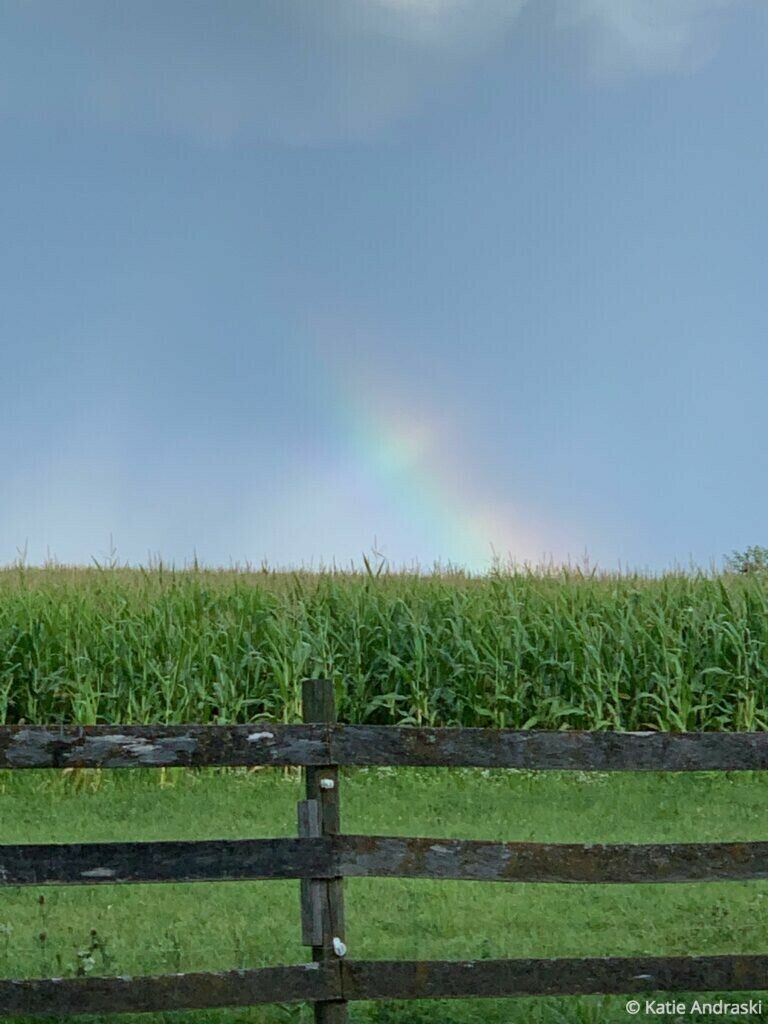
If you’d like to receive my blog posts when they’re posted, click here and sign up.



I wonder if we are about the same age. I am 71 – i too have lost all of my immediate family of origin. It’s a hard thing to explain what it feels like to be the last one. If I remember right, you live somewhere west of Chicago?
I’ll be subscribing to you blog. Nice to stay in touch instead of whenever i happen to see it on Create I Writing post.
We are close in age, though I’m a little younger than you. My family of origin was gone by the time I was 32. It was a very painful time. I do live in northern Illinois Are you in the Midwest? Thanks so much for subscribing to my blog. I am glad we can stay in touch.
Interesting piece, Katie. I’m not sure what you’re trying to say at the end. Are you expressing a hankering for Universalism? Who hasn’t such a wish . . . except maybe the damned who don’t seem to give a fuck! But I’ve lapsed into obscenity to make a point (and now I can’t let Karen read this.) Some people care about getting “saved,” and so they do. Some people don’t care at all, and they probably spend eternity that way. I heard a really fascinating conversation this week between James Bryan Smith whose writings I love and Paul Young who wrote The Shack, which I thought was heresy until I actually read it and then found it “outside the box,” but not outside the Bible. I’ve copied the link below in case you’d like to listen too. In their discussion, Smith and Young are describing the philosophical necessity for God making us with the ability to tell Him, “No.” Young adds that the Love of God surrounds all creation and all creatures, especially human beings. For those humans who say “yes” to God, the Love of God is Heaven. For those humans who say “no” to Him, God’s Love is Hell. That’s the only way that I can reconcile the wonder of it all myself. What do you think? https://apprenticeinstitute.org/2019/08/14/conversation-with-william-paul-young/
I’ll try to listen to that interview in the next day or two. I read The Shack during a very difficult time and liked it very much. I loved its emphasis on deep forgiveness. Yes I am expressing a hankering towards universalism. There are some mysterious passages throughout the Bible that point towards it. On Facebook I’ve been reading Kenneth Tanner and I am listening to the Synaxis podcast they have said the fire that Jesus wanted to set on this earth is the fire of God’s love. That’s why I ended this the way I did. There were early church fathers who believed this as well.I would agree with those who say yes to God, the Love of God is heaven. Those who say no, God’s love is hell. Yes I’d agree with that. So good to hear from you. I ordered a book about this called That All Shall be Saved by David Bentley Hart that I hope will help me sort this out.